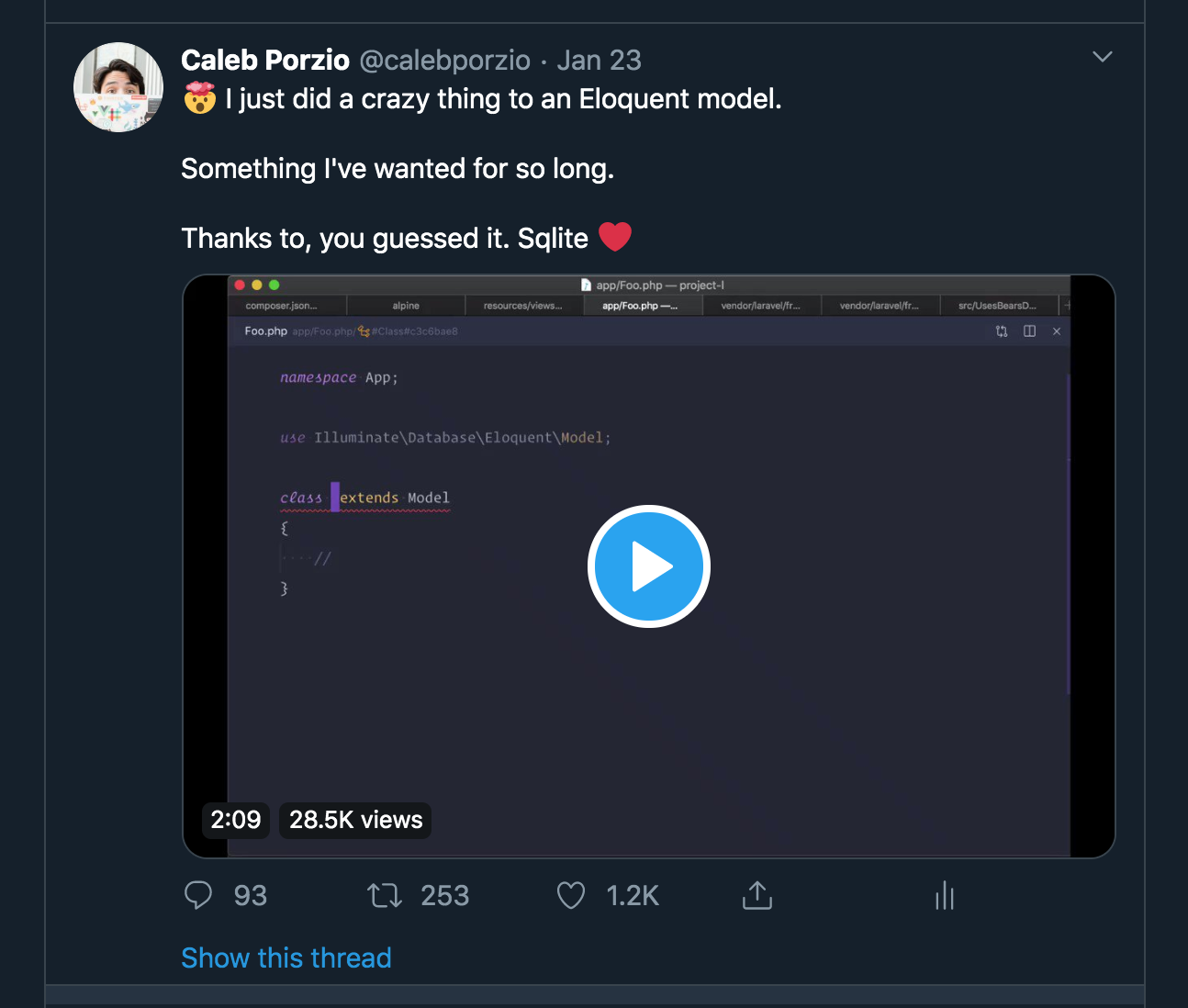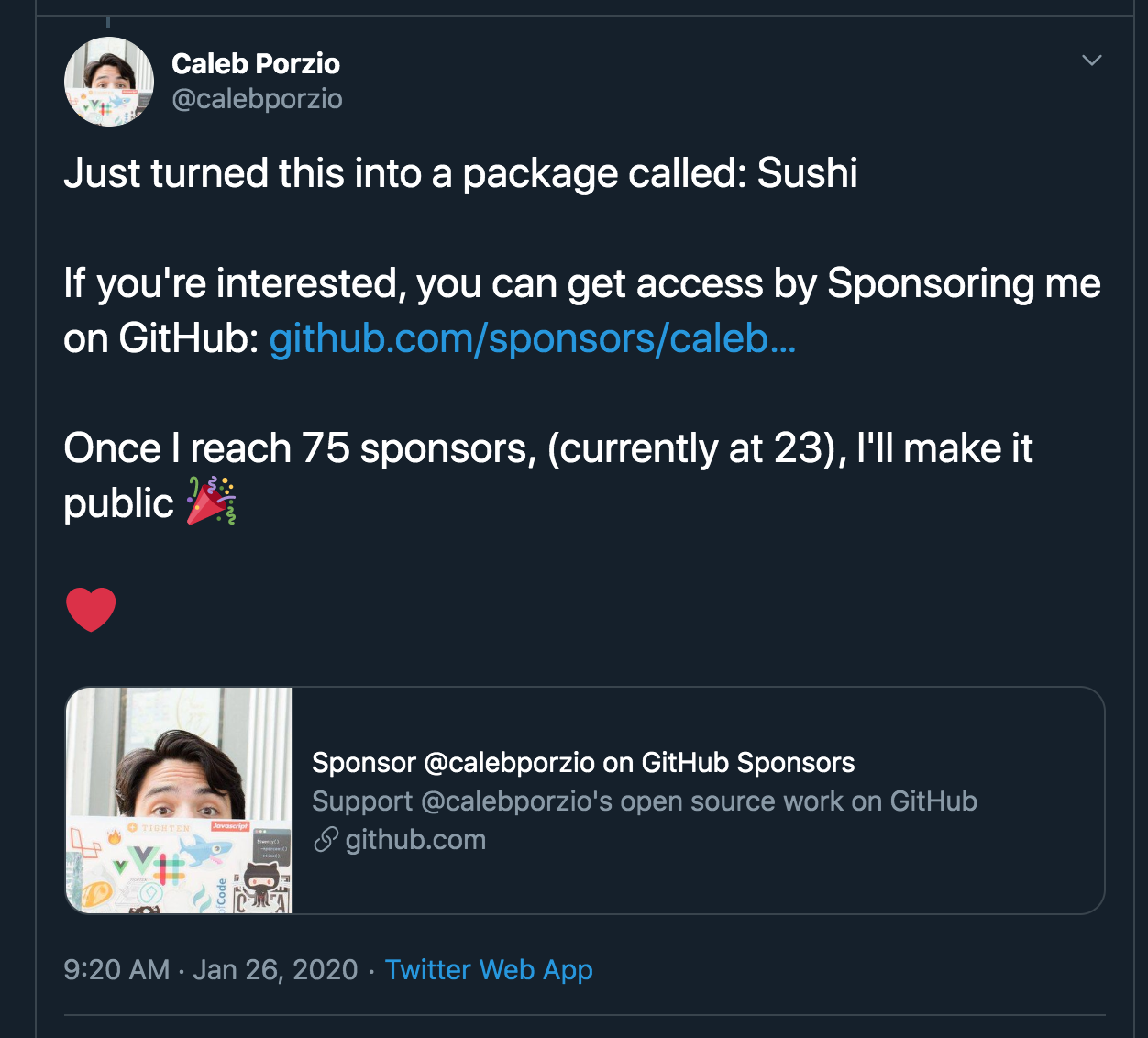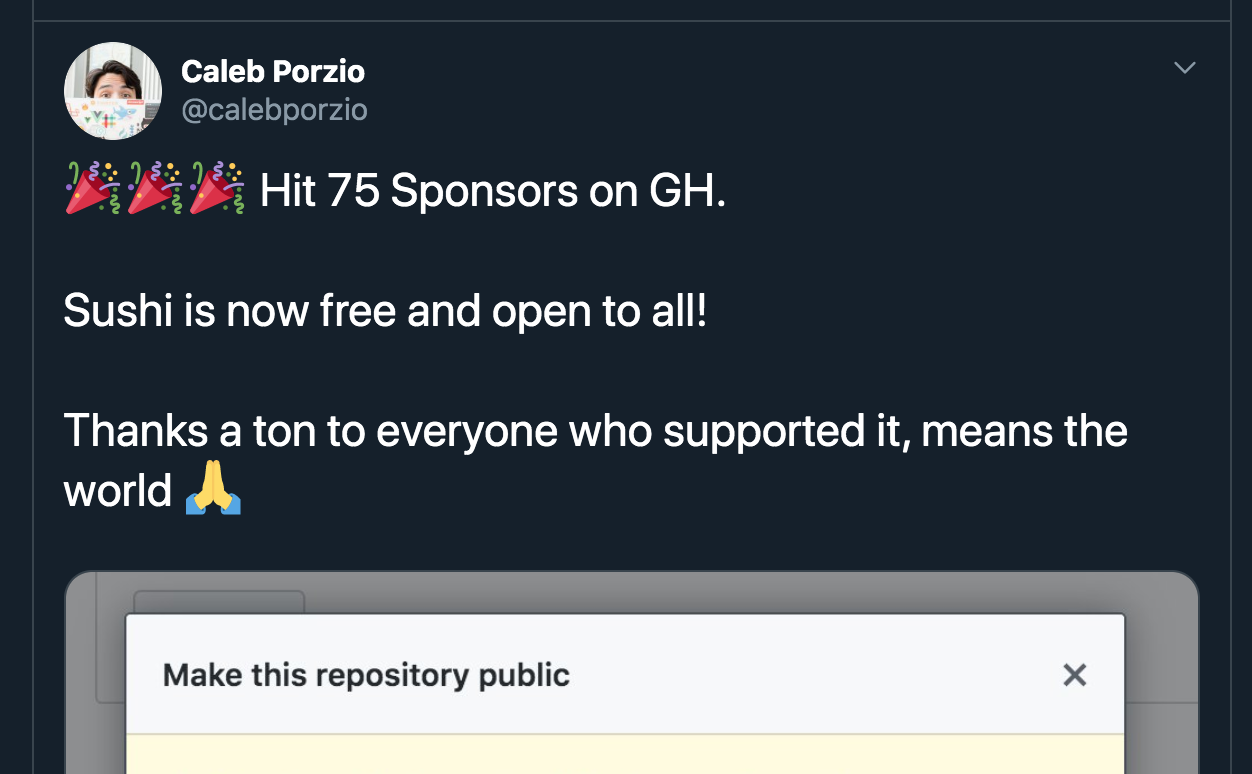Introducing Sponsorware: How A Small Open Source Package Increased My Salary By $11k in Two Days
Feb 2020After digging deep on SQLite during a pair programming session with a client/friend, I had an idea…
About 45 minutes later, a proof-of-concept was tweeted it out:
Based on the number of replies containing nothing more than a single 🤯 emoji, I could tell people dug the experiment. I immediately started getting requests to share the code or publish an open-source package.
At the moment, I felt like I had two options ahead of me.
- Publish a free, open-source package on GitHub.
- Somehow charge for the code. (Possibly only releasing it to people who sponsor me on GitHub)
The Problem
There are two problems I saw with these options.
- If I open source this thing, I’ll have to maintain it for free, forever. I already spend almost all my time working on open source projects like Laravel Livewire and AlpineJS and make almost nothing doing it.
- If I charge for it, I’ll probably not make THAT much money, and I’ll be severely limiting the package’s usage and growth. I ALSO have personally benefited so much from open source and something about putting up a pay-wall felt off to me.
The Solution
I talked it over with my good buddy Daniel Coulbourne on our podcast No Plans To Merge, and we (mostly he) came up with a pretty rad solution.
Here’s the little snippet that started this whole thing:
After hearing me out, Daniel proposed a (brilliant) third solution:
- Build and release the package exclusively to people who sponsor me on GitHub, but after reaching a certain number of sponsors, make the package fully open-source and available to all.
I adored the idea. It seemed like the best of both worlds. It hit all the points I wanted:
- Makes money (I don’t have to slave away at the keyboard for free like so many other projects I’ve started)
- Gives people immediate value (people could sponsor me and get access to the package right away)
- Doesn’t restrict future potential growth of the project and upholds the spirit of open source
Two days later, “Sponsorware” was born.
I wrote the first iteration of the package in one day and sent out an email and tweet the next morning.
Before the email went out, I had 23 sponsors and was making $573/mo from GitHub Sponsors.
I announced I would be open-sourcing the package (Sushi) after I reached 75 sponsors. (decided to up it at the last minute from the original 40)
By the next evening, I hit 75 sponsors and was now making $1560/mo from GitHub Sponsors 🎉!
What a ride!
In two days, I increased my GitHub sponsors monthly revenue from $573 to $1560. That means, over the course of a year, I increased my earnings by $11,844!
For a guy who spends most of his time programming for free, that means a whole lot.
Reflecting
I’m overwhelmed with gratitude towards the community. I’ve since grown to 101 sponsors and am generating $2633/mo from GitHub Sponsors (at the time of writing). Not enough to start eating avocado toast every day, but certainly enough to cover rent and groceries. (Low rent costs brought to you by Buffalo NY 🤑)
Not long after, The Changelog had me on to talk about the newly coined “Sponsorware”, you can listen to the episode here. After that, WIRED magazine contacted and interviewed me for a potential article! (50/50 shot at getting published, but still pretty cool)
My hope is that the word spreads and this model will provide another pathway for open source maintainers to fund their work. This way, they can keep doing what they love, and the community can continue benefiting from the work.
I DEFINITELY have plans of repeating the “Sponsorware” formula very soon.
Disclaimers (Your Mileage May Vary)
It's worth mentioning that some stars aligned for this to happen:
- I already have a pretty decent following of developers that I could communicate to easily (10k Twitter Followers, and 3.4k email newsletter subscribers).
- The top subscription tiers include a logo in one of my project’s docs and a small amount of monthly consulting, so people who sponsored at those levels were getting more than just access to Sushi.
- It’s pretty rare for me to have an idea as small, yet eye-grabbing as Sushi.
The Big Picture
In my career as a web developer, every company and agency I’ve worked for has directly benefited from open source software, usually in a big way. A lot of times, an agency’s core business model is based on advertising proficiency in open source projects.
Frameworks like Laravel and Vue have things like conference sponsorships to offer, but for someone like me with smaller projects, it’s hard to provide EXTRA value to companies and agencies on top of the work I’m already doing.
It never really occurred to me as an imbalance in the force, but now working as a maintainer almost full-time, I’m face to face with the reality: It’s really effing hard to make money in open source.
I went from a solid ~$90k dev salary in 2018 to a ~$40k one in 2019, and most of that is from little consulting gigs.
That said, I’m very optimistic about the future. There are lots of efforts going on right now to fix the problem, projects like Open Collective, Patreon, and GitHub Sponsors to name a few. Also, media outlets seem very interested in covering stories on the topic.
Here’s to a future where maintainers (even Jeb Schmidts like myself) get paid too!
If you’ve seen someone attempting this model in the wild (or have even done it yourself), I’d love to hear about it. My Twitter DMs are always open!
Update: There is now a dedicated GitHub repo to host the Sponsorware “recipe” and case studies: https://github.com/sponsorware/recipe
Thanks for tuning in!
Caleb
My Newsletter
I send out an email every so often about cool stuff I'm working on or launching. If you dig, go ahead and sign up!
 (
( (
( (
(